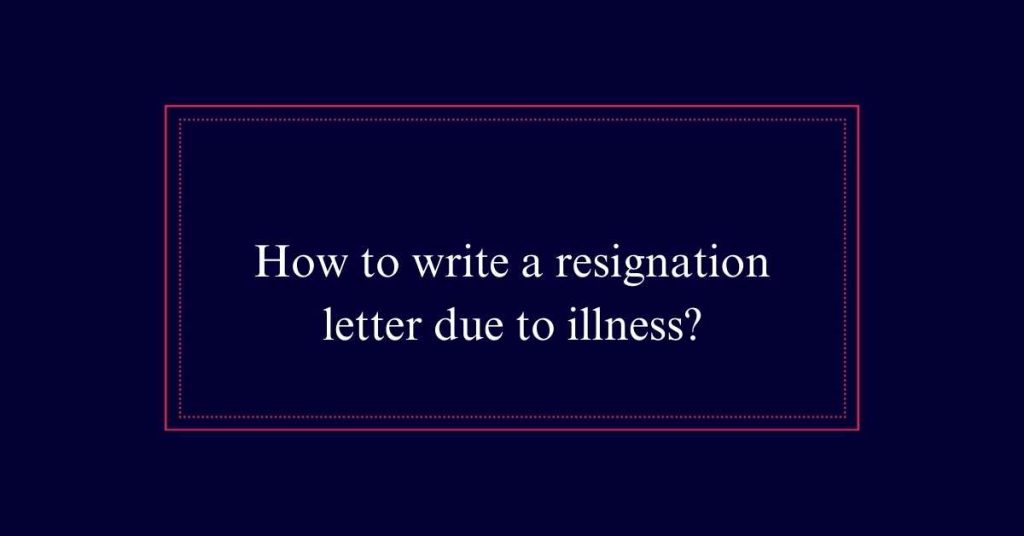How to write a resignation letter due to illness?
Writing a resignation letter due to illness should be done professionally and concisely. Begin with a brief explanation of your illness and clearly state your intention to resign, including the last working day.
Express gratitude for the opportunities provided and offer assistance in the handover process. Maintain a positive and respectful tone throughout the letter. Review for clarity, conciseness, and professionalism, ensuring there are no grammatical errors.
Understanding Resignation Letters
Understanding resignation letters is essential for ensuring a smooth and professional departure from your job. A resignation letter formally notifies your employer of your intent to leave the company. It is important to approach this task with care and precision.
A well-crafted resignation letter helps maintain positive relationships and leaves a good impression. This document should include key information: your intent to resign, the effective date of your resignation, and a brief explanation if necessary.
Being concise and clear in your communication is vital. Doing so demonstrates professionalism and respect for your employer. Properly writing a resignation letter sets the stage for a graceful exit and can have a significant impact on future professional opportunities.
Legal Rights and Entitlements
When crafting your resignation letter due to illness, it’s crucial to understand your legal rights and entitlements. Being informed guarantees you receive all the benefits you are entitled to, such as sick leave, disability benefits, and health insurance continuation. Below is a summary of key entitlements:
| Entitlement | Description |
|---|---|
| Sick Leave | Paid leave for medically certified illness |
| Disability Benefits | Financial support if illness prevents working |
| Health Insurance | Continuation of coverage after resignation |
| Severance Pay | Potential compensation depending on contract |
Make sure to consult your employer’s policies and relevant laws. Seek legal advice if necessary. This will ensure a smooth handover and safeguard your rights.
Writing Guidelines
Creating a clear and respectful resignation letter due to illness requires careful consideration of both content and tone.
Start with a brief explanation of your illness, but avoid delving into medical specifics.
Clearly state your intention to resign and specify your last working day.

Express gratitude for the opportunities you’ve had and the support received from colleagues and supervisors.
Offer to assist with the handover period and provide help in training a replacement if possible.
Maintain a positive and professional tone throughout.
Ensure the letter is concise and to the point, avoiding unnecessary details.
Proofread carefully to ensure clarity and correctness before submitting the letter.
Professionalism in Letters
Maintaining professionalism in your resignation letter due to illness is vital to leave on good terms and preserve your professional reputation. Be clear and concise. Mention your illness without going into detail. Express gratitude for the opportunities you had. Offer assistance during the handover. Make sure your tone remains respectful and positive.
| Emotions | Actions |
|---|---|
| Gratitude | Thank your employer |
| Respect | Use formal language |
| Responsibility | Offer handover help |
| Positivity | Highlight positives |
| Sincerity | Be honest and sincere |
A professional letter helps you maintain relationships and keeps doors open for future opportunities. Focus on your health and well-being, but remember to communicate your departure in a dignified manner.
Final Touches and Tips
Ensure your resignation letter is polished by reviewing it for clarity, conciseness, and professionalism. Start by reading through the letter to spot any errors. Make sure that your tone remains respectful and positive.
Use simple language and keep sentences short. Check that all necessary information is included, such as your last working day and a brief reason for your resignation. Avoid going into too much detail about your illness.
Proofread for grammar and punctuation errors. Consider asking a trusted friend or family member to review it as well.
Mental Health Considerations
Addressing mental health in a resignation letter requires sensitivity and respect for both personal privacy and workplace professionalism. It is important to be honest but also to protect your own mental well-being.
When writing, keep the details minimal and focus on the main reason for your resignation. You might say, ‘Due to personal health reasons, I must step down from my position.’ This approach guarantees clarity without exposing too much.
Always maintain a respectful tone and express gratitude for the opportunities you had. Remember, your mental health is vital.
Seeking professional guidance before crafting your letter can provide valuable support and make certain that your message is clear and respectful.
Addressing Mental Health
When discussing mental health in a resignation letter, clarity and respect are vital. Begin by stating your intent to resign due to mental health reasons. Keep the explanation concise but clear.
There is no need to detail your condition extensively; a brief mention is sufficient. Emphasize the importance of focusing on your well-being. Acknowledge the support you have received from your employer, if applicable.
Maintain a professional tone throughout the letter. Express gratitude for the opportunities and experiences gained during your tenure. Offer assistance with the handover period if possible.
This approach guarantees the letter is respectful and professional while addressing a sensitive topic.
Resigning for Family Illness
Resigning due to a family illness requires a thoughtful and compassionate approach in your resignation letter. Clearly express your need to care for a sick family member. Show gratitude for your employer’s understanding and support. Offer to assist in the handover process to guarantee a smooth transfer of your duties. Below is a simple table to help guide you:
| Section | Content | Example |
|---|---|---|
| Reason for Resigning | State the reason for your resignation | “I must resign to care for a sick family member.” |
| Gratitude | Express thanks for the support and opportunities provided | “Thank you for your understanding and support.” |
| Handover Assistance | Offer help with the handover process | “I am willing to assist in finding and training my replacement.” |
Frequently Asked Questions
How Should I Notify My Colleagues About My Resignation Due to Illness?
Notify your colleagues about your resignation due to illness through a brief and sincere email. Express gratitude for their support, mention your reason for leaving, and offer to assist with the handover if possible.
Can I Request a Reference From My Employer After Resigning Due to Illness?
Yes, you can request a reference from your employer after resigning due to illness. It is advisable to make the request professionally and courteously, expressing your appreciation for their understanding and support during your tenure.
Is It Advisable to Mention Specific Medical Details in My Resignation Letter?
It is not advisable to mention specific medical details in your resignation letter. Instead, simply state that you are resigning due to health reasons. Maintain professionalism and privacy while expressing gratitude for the opportunity.
How Can I Maintain Relationships With My Employer Post-Resignation?
Maintaining relationships post-resignation involves expressing gratitude in your resignation letter, offering assistance during the handover process, and keeping in touch through regular updates. A positive exit can leave a lasting impression and open doors for future opportunities.






